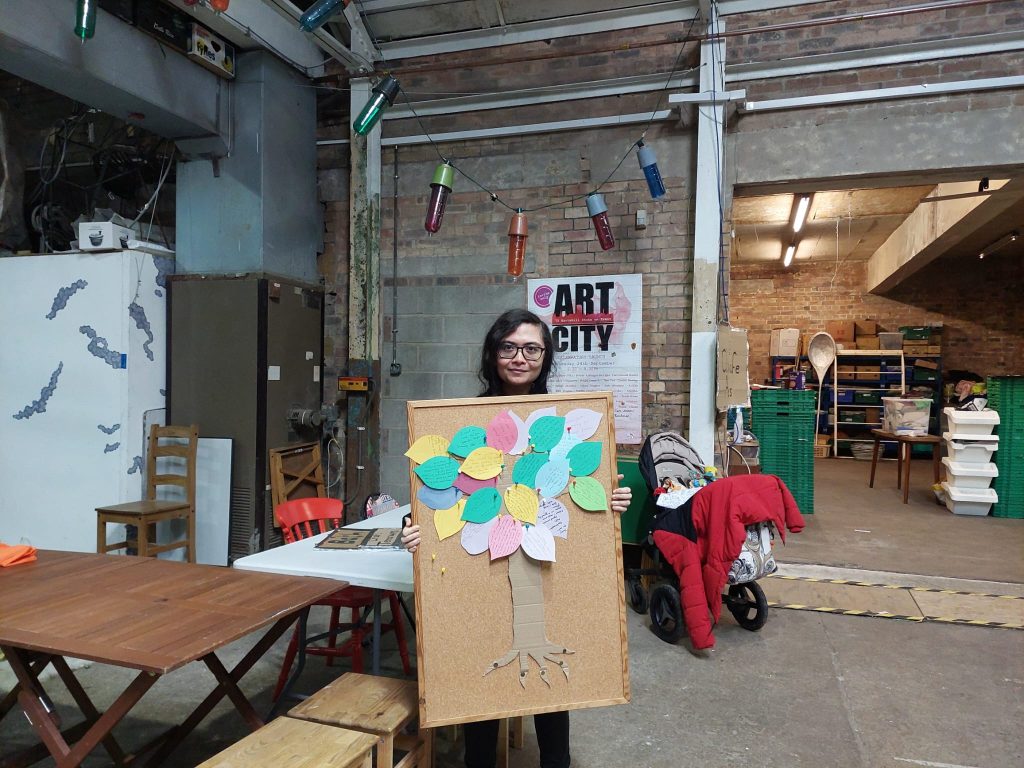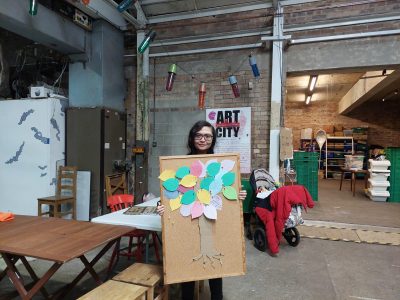Natalie Linh Bolderston has been our 2024 Stoke-on-Trent Writer in Residence. Natalie is a Vietnamese-Chinese-British poet from Stoke-on-Trent, and a 2018 Creative Future Writers’ Award winner. Her work focuses on her family’s experiences as refugees living in the UK, as well as the myths and stories that were passed down to them. In 2020, she received an Eric Gregory Award and co-won the Rebecca Swift Women Poets’ Prize. In 2021, she was shortlisted for the Forward Prize for Best Single Poem.
Natalie’s residency took place at B arts, a community café and arts centre; Drop City Books, an independent bookshop; and the Potteries Museum and Art Gallery. She ran both closed poetry workshops and informal drop-in sessions, covering a range of themes including the environment, local history and identity.
There is something special about running workshops in your hometown. It is both beautiful and terrifying to reveal yourself as a poet in a city that holds the memory of your younger, more awkward self. You feel almost like a child again, painfully earnest and vulnerable, holding out something you love and hoping that others will treat it kindly. But when a workshop group comes together out of a love for language — or you simply make a connection with someone over their favourite book or poem — a unique kind of alchemy occurs. Familiar places take on a new meaning; whatever room you are in fills with light.
I did not always believe that writing and leading creative workshops could form any part of my livelihood. Though Stoke-on-Trent — my hometown — is the place where I first learned to love words, as a teenager it was difficult for me to see how this could factor into my future career prospects. In general I liked my high school, but I don’t remember any authors or artists ever coming to talk to my year group. Quite a few of our careers talks actually came from army representatives — a fact that I now find deeply chilling.
My journey towards becoming a working poet began when I moved to Liverpool for university, where I took my first creative writing classes. When I later relocated to Greater London for my first job after graduating, I was able to take advantage of the vast number of workshops, readings and development programmes on offer within the city. These gradually led to opportunities for me to carve out my own career as a writer, mainly via poetry commissions and readings.
When I moved back to Stoke-on-Trent, I was determined not to leave those opportunities behind, so I began to look into the local arts scene. I found B arts, an arts centre and community café that had been active for almost forty years, but which I had never known about. I went to cultural events at the Potteries Museum and Art Gallery, a place I had visited often as a child — mostly to stare at the taxidermy wildlife. And within a year of my return to my hometown, Drop City Books opened: a radical, independent bookshop with an interest in poetry. In a city that is historically under-served in the arts, it seemed to me that all three organisations were working to make a difference. I wanted to find a way to contribute but felt shy about it, not knowing how to put myself forward.
The Creative Future residency gave me the confidence — and funding — to reach out to these places and ask to get involved. I proposed a mixture of ticketed workshops, drop-in workshops, and informal feedback sessions, and received enthusiastic responses from all three organisations.
Workshops are familiar territory to me, but for my residency I wanted to try things I had never tried before. While at the museum, I encouraged participants to interact with exhibits of their choice, and to think about the personal objects that filled their lives. At B arts, I helped visitors to write small eco-poems on paper leaves, and then pinned them to the cardboard tree I had made, to create a piece of collaborative art. At Drop City Books, I sat writing in the window with a sign beside me, encouraging passersby to ask questions. One girl showed me her photography, and explained how she hoped to incorporate poetry into her practice. Others simply sat down and told me about themselves, and the stories they had always hoped to write. I know now that there is more than one way to reach out to people creatively. A conversation about someone’s life is its own kind of poem. Giving someone the right reading recommendation will elicit a small, bright shift in their day.
I turned up to every activity slightly nervous about how it would go, but I tried to make the spaces as open and friendly possible. I was rewarded with kindness and curiosity; by the end of my residency, more than a hundred people had shared their memories or aspirations with me, and most had had a go at writing. Some had sat in the museum with me and written for two hours. Some had stopped by my B arts stand for ten minutes to write a few lines on a paper leaf. All of them showed me how valuable different kinds of workshop can be, and how each space has its own unique energy. All of them made me a more flexible and resourceful facilitator.
When I began the residency, I had been struggling with my writing — and my mental health — for some time. I am still finding my way out of the rough patch, but I have tried to stop measuring my worth as a poet by how much material I can produce and how many establishments might wish to publish me. The residency gave me the chance to reach beyond myself and share in the enthusiasm and creativity of others. It reminded me that collaborating, listening and cultivating safe spaces are also part of a writer’s work.
I am grateful to everyone who showed up for my activities and shared some part of their story. I don’t know where my writing will lead me next, but I do know that everyone I met has inspired me to continue showing up. They have inspired me to continue trying to create those rooms filled with light.

